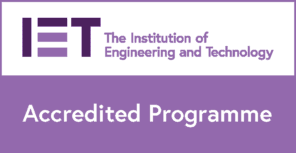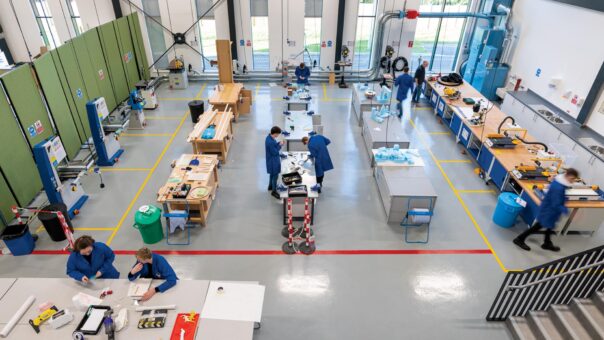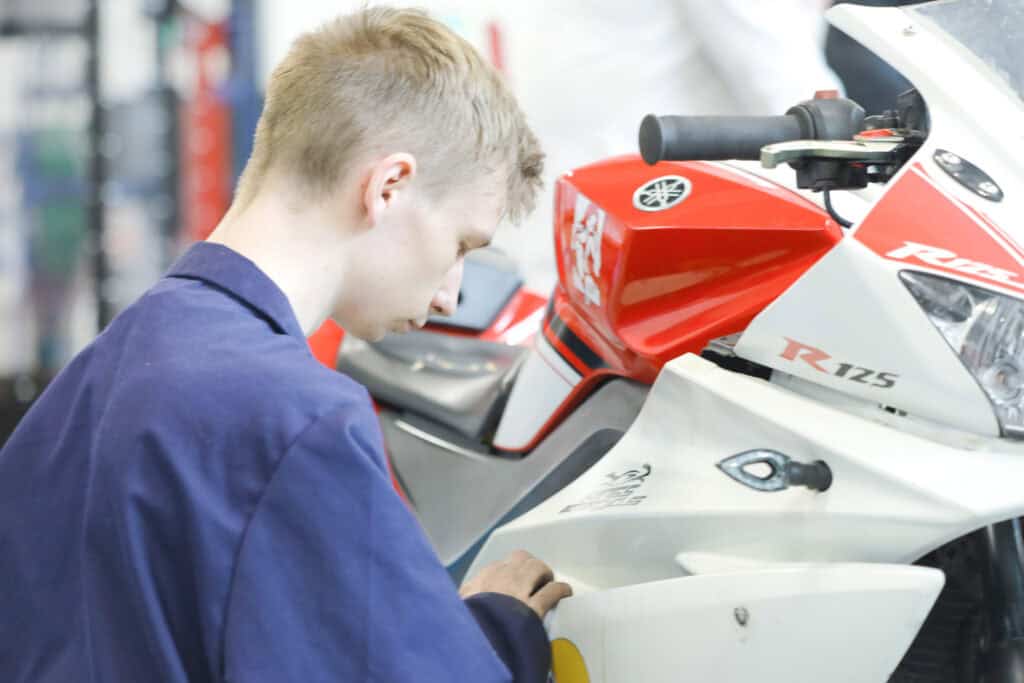Top 30
UK university
out of 122 institutions
Guardian University Guide 2025
100%
positivity for being free to be able to express ideas and opinions
National Student Survey 2024
92%
positivity for staff support your learning
National Student Survey 2024
Join us at one of our Open Days!
Saturday 11 October
Sunday 26 October
Saturday 22 November
Saturday 11 October
Sunday 26 October
Saturday 22 November
Our next Open Day is in:
Overview
Understand the key aspects of mechanical engineering
Important
This option is for you if you are interested in BEng (Hons) Mechanical Engineering but do not meet the course entry requirements yet, or if you want more time to prepare for higher education.
This Foundation Year prepares you to transition to our other Engineering degrees and is not a standalone programme.
Our BEng (Hons) Mechanical Engineering with Integrated Foundation Year course develops your understanding of mechanical engineering science as well as your practical skills and knowledge following an initial foundation year that prepares you for higher education study within an engineering context.
Institute of Engineering and Technology (IET) accreditation
This course is accredited by the IET, one of the world’s leading professional societies for engineers and technicians. The accreditation means that it will be easier for you to apply for professional registration as a chartered or incorporated engineer after graduation.

Build your knowledge and confidence with an initial foundation year
You will complete an extra year of study before starting your BEng to build your subject knowledge and develop your academic writing, reading and research skills.
Throughout this first year, you will develop your research, communication, teamwork and problem-solving skills, and cover a range of topics including physics, mathematics, electronics and computing, and the practical application of these to engineering disciplines.
Learn the science behind mechanical engineering
From manufacturing techniques to programming, you will develop a strong level of knowledge and understanding of a wide range of mechanical systems and applications you will need to prepare for a successful career in engineering and science.
Study specialist areas including:
- Manufacturing techniques
- Machines
- Structures
- Materials science
- Heat transfer
- Fluid mechanics
- Programming.
Discover our specialist engineering laboratories
Our dedicated engineering teaching and practice spaces allow you to use first-class, industry-standard equipment throughout your studies, as you gain a professionally-relevant and engaging engineering learning experience.
- Specialist mechanical labs
- Dedicated teaching labs
- Machine tool workshop
- Project workshop
- Computer-aided engineering suite.

Develop the right skills to thrive within the industry
This course has been designed in partnership with local businesses to ensure you are ready for the industry when you graduate. You will complete multiple design-build-test challenges that test your theoretical engineering understanding and practical skills in line with current industry standards.
Apply your learning to practical projects
The University of Chichester is a member of the unique CDIO (Conceive – Design – Implement – Operate) worldwide initiative, which means our courses are designed to be practical and lab-focused from the beginning.
This ensures that you receive an engaging experience which encourages interdisciplinary teamworking to solve open-ended problems and develops your communication skills, which will help you stand-out in a competitive industry.

On this course you will:
- Build your academic confidence and abilities as you complete an initial foundation year before you continue onto your full degree.
- Gain an in-depth understanding of mechanical engineering in line with industry requirements.
- Learn in dedicated engineering labs and use first-class equipment.
- Develop the skills and knowledge required to succeed in a rapidly evolving industry.
- Explore industrial work placement opportunities.
- Apply your theoretical learning and planning through practical, collaborative projects.
BEng (Hons) Mechanical Engineering
We also offer our BEng (Hons) Mechanical Engineering without the integrated foundation year.
The Course
Gain a comprehensive understanding of mechanical engineering
Year One (Integrated Foundation Year)
Your first year is your foundation year, and provides you with a base level of information that you will build upon over the rest of your studies.
You will study a broad array of content as you explore fundamental science, mathematics, electronics, computing, design, report writing and communication skills.
Year Two
In your second year, you will explore the key fundamentals of mechanical engineering, as well as computer-aided engineering, mathematical principles and elements of electrical engineering.
Year Three
Your third year builds on your previous learning to explore more specialised elements of mechanical engineering, including dynamic systems, statics and materials and advanced mathematical principles.
Year Four
In your fourth year, you will work as part of group to undertake a final engineering project that will act as a culmination of your studies.
Alongside this, you will explore industrially-relevant elements such as renewability and sustainability, as well as understand basic business concepts within a engineering contexts.
Collaborative learning
In your second year, you will take part in a team Conceive-Design-Implement-Operate (CDIO) challenge with other Mechanical Engineering students.
The third year CDIO challenge is an interdisciplinary team challenge where you will work with students from other engineering subjects.
In your final year, you will work on an individual project and present your work technically to other engineers as well as to a non-technical audience.
Modules
Select a year
Foundations of Learning and Professional Skills for Engineering
This module prepares you for full participation and engagement in engineering studies, by equipping you with effective and efficient communication and study skills and practical exercises to apply these skills to engineering studies.
The module also provides the necessary mathematics to enable entry into the first year of BEng. degrees. The module assumes little or no experience in applied mathematics at level 3 (A level, BTech).
You will be taught the relevant skills to progress to the BEng courses.
Foundations of Engineering
This module forms the foundation engineering knowledge, the module is designed to let you explore mechanical and electrical engineering foundations and build a firm foundation for subsequent study in engineering as you move into the full BEng programmes.
It begins with an introduction to Newton’s laws of motion and ends with the application of static mechanics to determine the forces, moments and deflections acting on simple mechanical systems under load. The latter forms a strong foundation to develop further skills and knowledge in the BEng mechanical engineering degree programme.
The module also aims to provide you with the grounding fundamentals in electricity that are required for further study in engineering and/or science.
Project
This project is an applied piece of work related to your chosen degree. It will require you to apply the knowledge and skills developed throughout the foundation year and will enhance your ability to work individually and as part of a team.
During the project you will develop in-depth knowledge of your chosen future specialisation. You will be encouraged to demonstrate creativity in the design, planning and execution of a project.
Engineering Projects
This year-long module is an opportunity to work within a group on a defined project offered by departmental staff. You will develop your research, planning and practical skills, from inception to completion, and develop skills in appraising your results to identify solutions supported by relevant theory and literature.
Engineering Laboratory 1
This module develops your basic laboratory and analytical techniques and develops your mathematical, statistical and IT skills. You will practise recording laboratory data and maintaining a lab-book. You will encouraged to think independently, analytically and creatively in order to interpret laboratory data and understand it in light of available literature.
Electrical Principles
The module will provide you with the fundamentals, tools and techniques required for DC and AC circuit analysis. You will be introduced to the fundamental properties of electromagnetic fields and their application in engineering context.
Mathematical Principles I
This introductory module provides a mathematical foundation for Engineering students. This module assumes some experience in applied mathematics at level 3 (A level, BTEC) and is essential for studying other modules in electrical and mechanical engineering.
Mechanical Principles
In this module you will explore statics, dynamics thermodynamics and fluid mechanics. You will gain a wide understanding of the basic principles of mechanical engineering.
Professional Digital Engineering Skills
This module provides a basic introduction to several software packages that are used in the BEng degrees and is aimed at providing a basic competency in using them. The module also stresses the importance that CAE plays in modern engineering practice and encourages the student to self learn software and programming skills as required.
Control and Instrumentation
This module will introduce you to the important fields of instrumentation, sensing and control design for electromechanical systems. You will then be able to select a suitable transducer and associated system for a given measurement application and to consider possible alternative solutions and demonstrate a thorough understanding of feedback control system principles.
Dynamic Systems
This module introduces you to using Newtonian Mechanics to model mechanical systems that evolve with time. You will explore engineering applications with these applications throughout the module, such as vehicle dynamics, vibrations and oscillations in mechanical systems, and effects of material properties on dynamic behaviour.
Engineering Projects
This year-long module is an opportunity to work within a group on a defined project offered by departmental staff. You will develop your research, planning and practical skills, from inception to completion, and develop skills in appraising your results to identify solutions supported by relevant theory and literature.
Mathematical Principles II
This module builds on your studies in Mathematical Principles I and is essential for studying other modules in both electrical and mechanical engineering.
Statics and Materials
This module will introduce you to static loading of structures and the importance of materials to the mechanical characteristics of structures under load.
2nd Year Mechanical Labs
This module builds on your learning from the Engineering Laboratory module in your first year. You will develop your laboratory and analytical skills as well as your mathematical, statistical and presentation abilities. You will record laboratory data, maintain a lab-book and be encouraged to think independently, analytically and creatively to interpret laboratory data. You will work to understand how data can be used by comparison with theory and other analytical methods. You will communicate your findings effectively in developing electronic laboratory reports.
Individual Engineering Projects
This module is an opportunity to work in a group on a defined project offered by departmental staff.
You will develop your research, planning and practical skills, from inception to completion, and develop skills in appraising your results to identify solutions supported by relevant theory and literature.
You will document a detailed project plan and present your work practically, visually and through presentation.
You will also get the opportunity to develop your skills in time management, constructing and documenting a detailed project plan and presenting and defending your work visually and orally.
Manufacturing Processes
In this module you will explore an in-depth exploration of state-of-the-art manufacturing processes such as castings, mouldings, machining and additive manufacturing. You will learn the theoretical and practical skills to design and select suitable manufacturing processes for engineering structures and components using a combination of seminars and workshop/laboratory activities.
Renewable Energy & Sustainability
This module will introduce you to the fundamental operating principles of commonly adopted renewable energy sources and the economic and ecological impact of these different generation types. You will cover electrified transportation and explore the technologies for future ‘smart grid’ power networks.
The Professional Engineer and Society
This module aims to provide a basic grounding in professional engineering practice in society.
After completing this module you will be equipped with information and skills to appreciate ethical issues in the conduct of engineering practice within a diverse environment, keep record of personal development and run a small engineering start-up company safely.
Thermo-Fluids
This module provides a summary of common thermodynamics, fluid mechanics and heat transfer topics, covering essential areas that engineering students most likely require in their professional lives upon graduation.
Teaching and Assessment
Feel the support of our expert and experienced staff
Teaching
The course is delivered through seminars, workshops, tutorials, computer labs, physical labs and project practical time. You will spend about 50% of your time in seminars and tutorials and the remaining 50% in labs or completing project work.
In addition to scheduled learning activities, you will need to complete independent study outside of class hours.
Smaller class sizes to help your development
Our commitment to smaller class sizes allows you to feel more confident to discuss your ideas in a supportive environment and allows your tutors get to know you and how best to aid your development.
Assessments
You will be assessed through a range of assignments, including:
- Coursework
- Written exams
- Lab and practical work
- Project work
- Presentations
- Online tests.
Facilities
Learn in our state-of-the-art Tech Park building
Discover our £35 million Tech Park
Our Bognor Regis campus boasts the £35m Tech Park and brings together science, technology, engineering, arts and mathematics courses on one state-of-the-art site.
- Dedicated engineering workshop and teaching spaces
- Specialist electronic and mechanics laboratories
- Machining centre
- Renewable labs
- Dynamic and thermofluids lab
- Digital electronics lab.
Electronic and mechanics laboratories
Our specialist engineering and mechanics laboratories provide you with industry-standard equipment.
Expert staff
Our industry-experienced staff get to know you and your learning needs to help you thrive.
Learning Resource Centre
The Learning Resource Centre (LRC) contains the library, a café, IT/teaching rooms and the Support and Information Zone (SIZ).
Library
Our campus library holds more than 200,000 books and over 500,000 eBooks.
Work Placements
Prepare for your career with practical placements
You can apply for a year-long industrial placement during your degree.
Gaining industry experience is invaluable. As well as giving you the opportunity to put your studies into practice and use the skills you develop on your course, completing a placement helps to improve your CV and show employers that you’ve already completed work in industry when you graduate.
Placements years usually take place between your third and fourth years of study. You will spend one year working with a company in industry before returning to the University to complete your final year. This effectively extends your studies by one year.
The placement will be a paid position, with pay at or above the National Minimum Wage.
Placement years are competitive. We will support you in finding and applying for a suitable placement, but we are unable to guarantee placements.
Study Abroad
Explore the opportunity to study part of your course abroad
As a student at the University of Chichester, you can explore opportunities to study abroad during your studies to enrich your educational experiences.
It’s a chance to broaden your horizons, a great opportunity to meet new people, undertake further travelling and to immerse yourself within a new culture.
You will be fully supported throughout the process to help find the right destination and institution for you and your course. We can take you through everything that you will need to consider, from visas to financial support, to ensure you get the best out of your time studying abroad.
Careers
Gain the right skills to help you thrive within the industry
The demand for electrical engineers continues to grow year-on-year and you will have the knowledge and skills required to succeed in a competitive and rewarding industry.
In addition, you will develop analytical, technical, communication and collaboration skills, which are all highly transferable and required by a wide range of employers and industries.
You could work in:
- Electronics
- ICT
- Automotive industry
- Manufacturing
- Electrical power
- Finance
- Transportation
- Construction
- Utilities.
Course Costs
Course Fees 2025/26
UK fee
International fee
EU/EEA Fee Reduction Scholarship
EU/EEA students automatically pay the equivalent of UK fees via the EU/EEA Fee Reduction Scholarship
For further details about fees, please see our Tuition Fee page.
For further details about international scholarships, please see our Scholarships page.
To find out about any additional costs on this course, please see our Additional Costs page.
Entry Requirements
Applying through Clearing
We know that you are so much more than your grades, which is why we take your aspirations, passion and personality into account. Through Clearing, we’re taking a flexible approach. Even if your grades are a little different from those advertised, please contact us – we’ll consider every application individually.
Typical offer (individual offers may vary):
UCAS
T Level
GCSE
IELTS
If you meet the foundation year entry requirements you will sign up to a full degree course at the same time as the integrated foundation year.
If you do not meet these entry requirements yet you could still be offered a place subject to a satisfactory interview.
Contextual offers
We believe everyone deserves an equal opportunity to pursue higher education, regardless of their background.
When we receive your application we consider your personal circumstances and the factors surrounding your achievements to see if you are eligible for a contextual offer. This is an offer with a reduced entry tariff – typically the equivalent of 8 fewer UCAS points for foundation year courses.
Find out more about our contextual offers.





